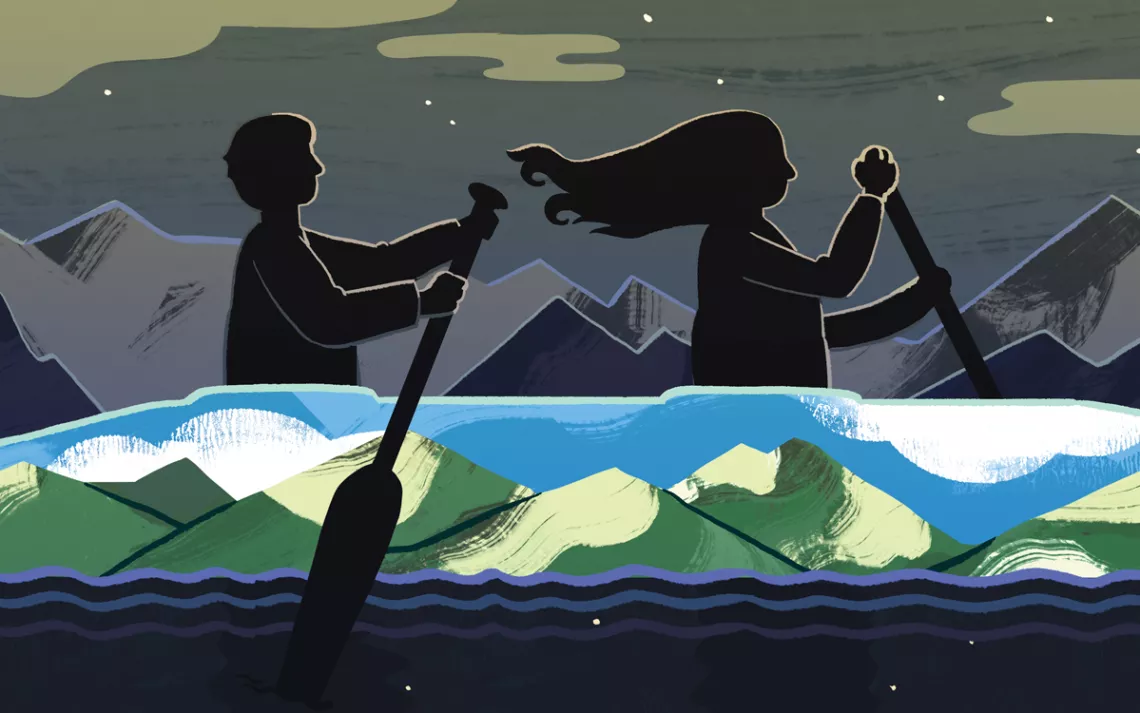Learning How to Speak with My Ancestors
I learned Alutiiq, my native tongue; now I am a whole person

Illustration by Aleks Sennwald
The Gulf of Alaska surrounds my home, Kodiak Island. The sea has fed and clothed my community both literally and figuratively for millennia. The Alutiiq word for sea or ocean is imaq; it also means "a liquid contained inside" and "contents." While learning to speak our language as an adult, I first became aware of the Alutiiq worldview through this root word, which resurfaces in many ways. It is part of imartuq (it is full) and imaituq (it is empty), but also imasuugtua (I have a sinking feeling). When you say "I am sad" in Alutiiq, the literal translation is "I am searching for my contents."
I lost my grandmother to Alzheimer's when I was young. Her mother was the last in my family to speak our language, and learning Alutiiq was my way of forging a connection I longed for, a link in the chain of my self-identity as an Alutiiq woman. For more than 200 years, our emerald-green archipelago has been colonized—first by Russians and then by Americans—and our people have suffered from a kind of cultural amnesia. At least under the Russians, the schools embraced Alutiiq alongside Russian. But the U.S. strategy was assimilation at all costs, and children caught speaking Alutiiq in school suffered corporal punishment. "English only" drove a wedge through our society, separating children from their language, culture, and families.
I grew up learning about my Sugpiaq Alutiiq ancestors mostly through a few family stories and the 7,000-year history visible in archaeological remains as my family hiked the land. Back then, before I knew more than a handful of Alutiiq words, my cousin Olga told me that we have to save our language because it holds our world within it. The sound of the ocean crashing on our shores echoes as words swish and crash from our mouths. Llurluni, for instance—"to slide down or slip"—features both "ll" (like "th" married to an "l") and the Alutiiq "r," deep and guttural like clearing your throat. At first, Alutiiq felt like a foreign language; my tongue was not used to making many of the sounds. But after the first year, it was like a light switch flipped. I saw connections in familiar place names and words my family used that they'd integrated into English.
My sons grew up with stuffed animals having Alutiiq names. They listened to me sing traditional Alutiiq songs and new lullabies we made up, and they joined an Alutiiq playgroup and took language classes. Now I'm working with a small group of other learners to uplift the Alutiiq language and worldview. Last year some filmmakers made a documentary about our efforts, called Keep Talking. At a panel discussion following its premiere, I was shocked by a statement from an Alutiiq elder: "I don't know how you people who haven't learned our language do not learn it," she said, "because without it you are not a whole person." At first, I feared her statement would drive people away, but the audience respected what she said. She spoke a hard truth.
Mary Peterson, another one of our Alutiiq elders, used to say, "Take care of the elder you will become." We all have a moral responsibility to carry forward ancestral wisdom and honor our connections to Earth, wherever our place may be, for the sake of community and individual wellness. For the Alutiiq people, our unguwacirpet, or way of being alive, is a harvest lifestyle, respectful of and sustained by the natural world. Despite over 200 years of assimilation, the life and heart—unguwaq—of our people is still tied to the stewardship of our homeland.
Happily, we still have some first-language speakers living today. I now speak at an intermediate-to-advanced level and am grateful for opportunities every week for full conversations with our elders—people who have survived personal tragedy, addiction, abuse, and historical trauma. Now, I feel, our language is a whisper of our place on Earth and our source for deeper knowledge.
This article appeared in the November/December 2018 edition with the headline "Found in Translation."
 The Magazine of The Sierra Club
The Magazine of The Sierra Club



